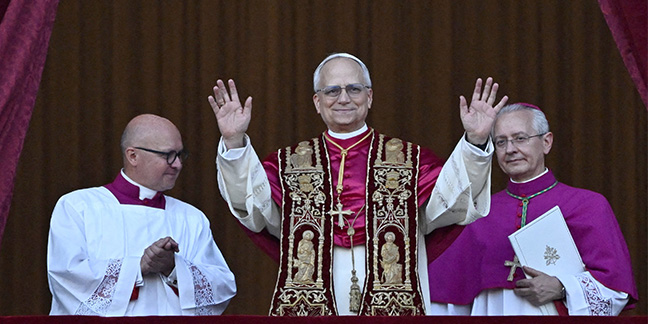 In his homily to the College of Cardinals May 10, Pope Leo XIV said he had chosen his name partly because, just as Pope Leo XIII addressed “the social question in the context of the first great industrial revolution,” today “the Church offers to everyone the treasury of her social teaching in response to another industrial revolution and to developments in the field of artificial intelligence that pose new challenges for the defense of human dignity, justice and labor.”
In his homily to the College of Cardinals May 10, Pope Leo XIV said he had chosen his name partly because, just as Pope Leo XIII addressed “the social question in the context of the first great industrial revolution,” today “the Church offers to everyone the treasury of her social teaching in response to another industrial revolution and to developments in the field of artificial intelligence that pose new challenges for the defense of human dignity, justice and labor.”
Joe Vukov, an associate professor of philosophy at Loyola University Chicago and the author of “Staying Human in an Era of Artificial Intelligence,” spoke with OSV News’ Charlie Camosy about the challenges posed by artificial intelligence, or AI.
Camosy: When I learned that our new Holy Father had taken the name Leo XIV, I immediately wondered if he saw himself as helping lead a response to massive cultural changes wrought by a technological revolution, just as Leo XIII was. What do you make of this?
Vukov: As you say, Leo XIII was pope during a moment of great social and cultural change, much like today. Rather than an industrial revolution, however, we face a revolution brought on by distinctively 21st-century technologies – artificial intelligence, robotics, social media and the like. The new Holy Father, in his first address to the College of Cardinals, has confirmed that this indeed inspired his choice of name.
One thing I love about Catholic social teaching is the balance it gives between abstract theological reflection and concrete advice. That’s what we need today. Pope Leo XIII provided that kind of guidance, and I’m hopeful that Pope Leo XIV will do so as well.
Camosy: What are some ways in which Catholic ideas and practices can help address the technological concerns with which the Holy Father is concerned?
Vukov: There are at least three: First, in this moment of social and technological change, it can be easy to lose sight of what makes us human. During Leo XIII’s papacy, humans were being reduced to “cogs in a machine,” and documents like “Rerum Novarum” resisted that view.
Today, we are facing a different kind of reductive view of our humanity – we are being presented with a vision according to which human intelligence can be artificially simulated, human achievement can be measured in terms of efficiency and productivity, and human relationships can be swapped out for digital ones. Compare that with the
Catholic view of human nature, according to which our intelligence is embodied and oriented to the truth, human dignity is not a matter of what we accomplish but rather grounded in our status as bearers of the image of God, and our lives are essentially relational.
The Catholic view of human nature is magnitudes richer than the one on offer in Silicon Valley. The world is hungry for such a view, and it is the job of Catholics to proclaim it boldly.
Second, the Church’s social and cultural teachings can help us address the great crisis of dehumanization we are facing. This crisis is similar in some ways to the crisis we were facing during Leo XIII’s papacy. During both periods, cultural forces were challenging the dignity of workers, the value of work itself and our understanding of what it means to flourish as a human being.
I’m worried about large-scale dehumanization brought on by new technology, yes, but also dehumanization on a more personal level. I’m worried about a future in which, on a very personal level, we never ask a friend for a book recommendation because we rely entirely on the algorithms of online retailers; I’m worried about a future in which we are so reliant on our Fitbits and Google Maps that we lose touch with our own bodies and environments; I’m worried about a future in which we can no longer write an essay (or even a thank-you note) because we have become so reliant on large-language models like ChatGPT. That’s a dehumanized existence.
Catholics will need to address this challenge of dehumanization in new ways.
A third way that Catholic ideas and practices can address current cultural and technological challenges is our fundamentally spiritual view of the world. The challenges posed by new technologies are not merely cultural and economic. They are also profoundly spiritual.
Leo XIII knew that in a moment of great social and cultural change, it isn’t enough for the Church to defend herself and her teachings on the social and cultural level. She must also defend herself on a spiritual level, calling to her assistance all the forces at her disposal – most crucially, Our Lady, Terror of Demons, together with the angelic forces, led by St. Michael – to “be our protection against the wickedness and snares of the devil.”
Our current moment is a moment of great cultural and technological challenges, yes, but also a moment of great spiritual challenges, one in which the devil’s snares are pervasive and dangerous.
I hope that our new Holy Father, Pope Leo XIV, brings not only the vision of cultural clarity of Pope Leo XIII, but also the sense of spiritual urgency.
Charlie Camosy is professor of medical humanities at the Creighton School of Medicine in Omaha, Nebraska, and moral theology fellow at St. Joseph Seminary in New York.


